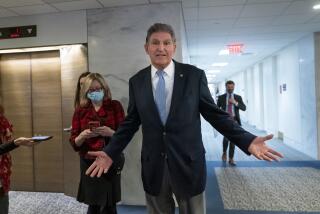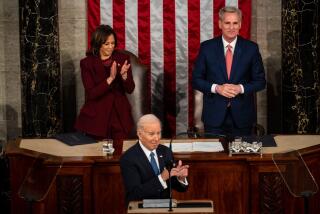Democrats Overtaxing Our Patience
- Share via
Campaigning for reelection in 1984, President Reagan said he was tempted to accuse his opponent, Walter Mondale, of taxing his patience. But he rejected the line, saying: “Why would I give him another idea?”
There’s always some truth in overstatement--in this case the incontrovertible truth that liberals always seek new tax sources so they can increase spending. But as the political left grasps for more revenue, it simultaneously fights fiercely to prevent rollbacks in existing revenue sources that have piled up over the years.
Amid our current prosperity, massive surpluses are now building up in the U.S. Treasury--the result of you, the taxpayer, having overpaid money to the federal government. These overpayments will continue over the next 10 years amounting to some $3 trillion.
This comes as no surprise, as the respected Heritage Foundation has reported:
* Eighteen years of federal tax increases have given American families the highest tax burden in peacetime history.
* The federal tax burden today is approaching 21% of the U.S. gross domestic product, compared to about 17 1/2 in 1983.
* This year, taxpayers are being soaked in proportions exceeded in only one year--when the United States was fighting a massive global war in 1944.
Which brings us to the current debate over the recent congressional tax cut that will hit President Clinton’s desk after Labor Day.
This Republican tax cut takes the monster overpayments extracted from you and returns a portion back while committing more than $2 trillion to rescuing Social Security and Medicare and paying down our national debt. The bill would reduce the system wherein married couples are penalized in higher taxes for having said their vows. Every taxpayer would get a reduction, and everyone would be more able to save for retirement.
There’s only one catch; Clinton will veto this bill. He calls it “a risky tax plan.” The only risk, of course, is that you might actually get to make your own spending decisions instead of delegating them to the likes of Barbara Boxer, Ted Kennedy and Henry Waxman.
The real risk for the ever-suffering taxpayer lies in the fact that Democrats want to extract these surpluses and any additional funds they can grab to spend more money--it being an article of left-wing faith that Americans are stupid while government is wise.
So the debate now has been reduced to the favorite wedge issue of the Democratic Party and its ultraliberal fellow travelers: class warfare. Their rancid demagoguery will focus on engendering hatred and resentment for those who have achieved financial well-being--otherwise known as success.
And their argument is a mockery of all that is American--the dream of unlocking the hope and opportunity that propel humans to excel and be rewarded with prosperity in an environment of freedom. In their socialized world, they engage in the rankest of stereotypes--spitting out the word “rich” as a derisive epithet, as if that justifies their confiscation of the product of your toil. Nowhere is this determination to pit Americans against each other more insane than in the tax that punishes individuals for dying. The benign name is estate tax. But it is in every respect a death tax--one which sucks out huge percentages of a life’s work and savings to fuel wild new spending schemes Democrats will use to extract Election Day fealty. The best campaign reform would be to deprive politicians of using tax dollars to buy votes.
Republicans must enter this tax debate with the commitment to fight and claw with the same tenacity for the taxpayer that Bill Clinton will exercise for a greedy government. This battle will not be won with flaccid rhetoric and arcane numerical references. It will be won only by invoking the good sense that a free society that fosters competition and rewards endeavor should permit hard-working Americans to keep more of what they earn, and to do so without the taunts and vitriol from the statist claque.
Here in Orange County, it has been reported that 70% of the original 300 employees of the exciting chip-making company Broadcom are now millionaires or better. It’s a safe bet that these 200 folks weren’t born wealthy, but gained it through risk-taking, innovation and the plain sweat that drove them to succeed. Why should some Washington dunce be favored over them to decide how those rewards are spent?
Kenneth L. Khachigian is a veteran political strategist and former White House speech writer who practices law in Orange County. His column appears here every other week.
More to Read
Get the L.A. Times Politics newsletter
Deeply reported insights into legislation, politics and policy from Sacramento, Washington and beyond. In your inbox twice per week.
You may occasionally receive promotional content from the Los Angeles Times.










